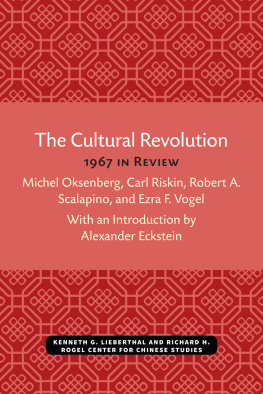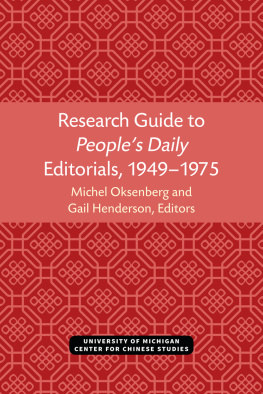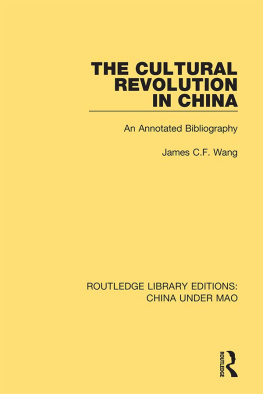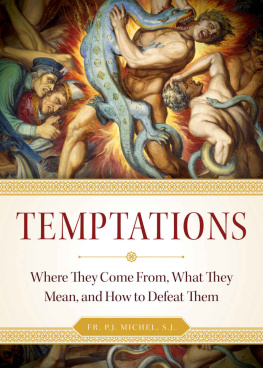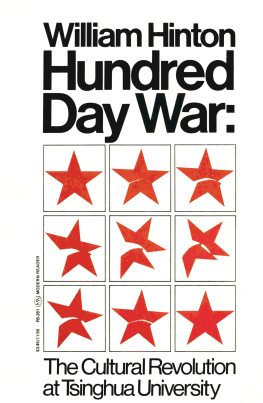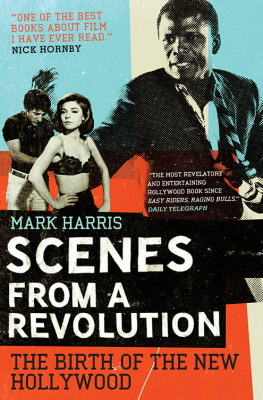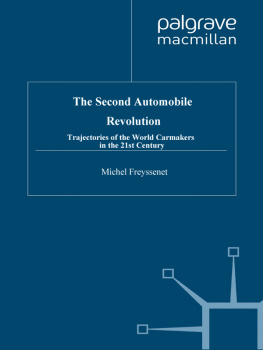Michel Oksenberg - The Cultural Revolution: 1967 in Review
Here you can read online Michel Oksenberg - The Cultural Revolution: 1967 in Review full text of the book (entire story) in english for free. Download pdf and epub, get meaning, cover and reviews about this ebook. year: 2020, publisher: Kenneth G. Lieberthal and Richard H. Rogel Center for Chinese Studies, genre: Politics. Description of the work, (preface) as well as reviews are available. Best literature library LitArk.com created for fans of good reading and offers a wide selection of genres:
Romance novel
Science fiction
Adventure
Detective
Science
History
Home and family
Prose
Art
Politics
Computer
Non-fiction
Religion
Business
Children
Humor
Choose a favorite category and find really read worthwhile books. Enjoy immersion in the world of imagination, feel the emotions of the characters or learn something new for yourself, make an fascinating discovery.
- Book:The Cultural Revolution: 1967 in Review
- Author:
- Publisher:Kenneth G. Lieberthal and Richard H. Rogel Center for Chinese Studies
- Genre:
- Year:2020
- Rating:3 / 5
- Favourites:Add to favourites
- Your mark:
- 60
- 1
- 2
- 3
- 4
- 5
The Cultural Revolution: 1967 in Review: summary, description and annotation
We offer to read an annotation, description, summary or preface (depends on what the author of the book "The Cultural Revolution: 1967 in Review" wrote himself). If you haven't found the necessary information about the book — write in the comments, we will try to find it.
The Cultural Revolution: 1967 in Review — read online for free the complete book (whole text) full work
Below is the text of the book, divided by pages. System saving the place of the last page read, allows you to conveniently read the book "The Cultural Revolution: 1967 in Review" online for free, without having to search again every time where you left off. Put a bookmark, and you can go to the page where you finished reading at any time.
Font size:
Interval:
Bookmark:

The Cultural Revolution: 1967 in Review
Four Essays by:
Michel Oksenberg, Assistant Professor of
Government at Columbia University
Carl Riskin, Assistant Professor of Economics at Columbia University
Robert A. Scalapino, Professor of Political Science at the University of California, Berkeley
Ezra F. Vogel, Professor of Sociology and Associate Director of the East Asian Center at Harvard University
Introduction by:
Alexander Eckstein, Professor of Economics and Director of the Center for Chinese Studies at the University of Michigan
Michigan Papers in Chinese Studies
No. 2
1968
THE UNIVERSITY OF MICHIGAN CENTER FOR CHINESE STUDIES
MICHIGAN PAPERS IN CHINESE STUDIES
Chang Chun-shu, James Crump, and Rhoads Murphey, Editors
Ann Arbor, Michigan
Open access edition funded by the National Endowment for the Humanities/Andrew W. Mellon Foundation Humanities Open Book Program.
Copyright 1968
by
Center for Chinese Studies
The University of Michigan
Ann Arbor, Michigan 48104
Printed in the United States of America
ISBN 978-0-89264-002-7 (hardcover)
ISBN 978-0-472-03835-0 (paper)
ISBN 978-0-472-12812-9 (ebook)
ISBN 978-0-472-90212-5 (open access)
The text of this book is licensed under a Creative Commons Attribution-NonCommercial-NoDerivatives 4.0 International License: https://creativecommons.org/licenses/by-nc-nd/4.0/
Contents
2 . OCCUPATIONAL GROUPS IN CHINESE SOCIETY AND THE
CULTURAL REVOLUTION
Michel Oksenberg
Carl Riskin
Robert A. Scalapino
.
Ezra F. Vogel
Introduction
by
Alexander Eckstein
The four papers in this short symposium volume were prepared for a research conference convened by the University of Michigan Center for Chinese Studies in March 1968. These papers and the conference as a whole were not intended as a detailed or exhaustive account of the course of the Cultural Revolution in Communist China. Although primary emphasis was placed on developments in 1967, the approach was to be topical and analytical rather than chronological and descriptive.
Proceeding on this basis Vogel opens up the discussion by exploring the general structure of the conflict unfolding in China. He then analyzes some of the key issues under contention, examines the factional struggles, and the character of the factions pitted against each other. Oksenberg pursues the problem further by examining the impact of the Cultural Revolution on the following occupational groups in Chinese society: peasants, industrial managers and workers, intellectuals, students, party and government officials, and the military. At the same time, he investigates how each of these key groups affected and shaped the Revolution and the conflicts within it.
While Vogel and Oksenberg are concerned with the impact of the Cultural Revolution on the system as a whole, Riskin and Scalapino analyze its effects on particular segments, i. e. the economy and foreign policy respectively. Riskin explores in particular how it may have affected production trends in agriculture and industry and the movements in foreign trade. He concludes with an appraisal of the Cultural Revolutions economics, i. e. the implications of Maoist economic policies for Chinas economic growth. Similarly in examing Communist Chinas foreign policy behavior during this period, Scalapino traces it back to both its Chinese historical roots and to the specific experiences of the Chinese Communist Party. Thus the Chinese Communists in general, and Mao in particular, brought to the process of foreign policy formation a curious combination of cosmic, utopian internationalism and practical ethnocentrism with both rooted in the dual legacy of Chinese tradition and Communist experience.
As is apparent from these papers there are many alternative ways of viewing the origins, the dynamics and the consequences of the Cultural Revolution. Most of our evidence concerning these cataclysmic developments come from the so-called ta tze-pao (wall newspapers) and various Red Guard newspapers of uncertain reliability. Occasionally there are some externally verifiable reports or some bits of objective evidence such as the 30 to 50 disfigured and tied bodies recently washed down into Hong Kong waters. Therefore we will undoubtedly have to wait some time to gain a better perspective on this phase of Communist Chinas evolution.
In the meantime and on the basis on presently available evidence, it would seem that the Chinese Communist system was from its very inception based on an inherent contradiction and tension which erupted from time to time with the Cultural Revolution merely being its latest and most violent manifestation. Built into the very structure of the system was an inner conflict between the desiderata, the imperatives, and the requirements of technocratic modernization on the one hand and Maoist values and strategy on the other. In a certain sense Maoism can be viewed as totalitarian populism. Just as the Russian populists of the 19th century favored economic development as long as it could be achieved without sacrificing traditional rural-based values, so Mao wants to industrialize China but only if this can be done by keeping the masses, the people, permanently mobilized and in a state of permanent revolution. Thus Mao is committed to economic development as long as it can be based on mobilization politics and mobilization economics rather than on technocratic modernization.
One might therefore conclude that Mao would like to see China transformed and modernized without the social and political consequences flowing therefrom. He seems to be particularly concerned about the consequences of functional differentiation, the rise of autonomous interest groups, and the burgeoning of a technocratic bureaucracy be it in the Party, in the Government, or in the Military. This concern is in turn based on a fear that bureaucratization would lead to routinization and a loss of revolutionary lan.
This inner tension and conflict characterizing the system has then significantly contributed to a cyclical pattern of evolution in Communist China. Thus technocratic modernization more or less carried the day during the First Five Year Plan (FFYP) period. Soviet methods of economic planning, Soviet technology in industry, and Soviet military doctrines and weaponry exerted significant influence in China between 1950 and 1957. Apparently frustrated by the lack of agricultural progress and what this might imply for the rest of the economy, the Maoists embarked on the Great Leap in an attempt to substitute mass mobilization techniques for a strategy based on technocratic rationality. Just as the FFYP strategy permeated all aspects of the system, i. e. the Party, the Government, the Army, and the economy, so did the shift to the mobilization strategy of the Great Leap mark a sharp change in policy in all of these spheres. Mobilization entailed growing politicization of the military, of the economy, and of government administration. Moreover, in the military sphere it marked a growing emphasis on a peoples war strategy.
As the Great Leap produced a great crisis, Chinese Communist planners were forced by necessity to revert to the path of technocratic modernization in the early 1960s. However, this reversal was never unqualified and was applied much more to economic than to military affairs. This very reversal then produced certain consequences (e.g. disintegration of the communes, weakening of the agricultural collectives, spread of private plots and markets), which must have appeared profoundly disturbing to Mao. Thus the Cultural Revolution may be viewed as Maos way of counteracting the social and political consequences of economic and other modernization programs following the Great Leap disaster.
Font size:
Interval:
Bookmark:
Similar books «The Cultural Revolution: 1967 in Review»
Look at similar books to The Cultural Revolution: 1967 in Review. We have selected literature similar in name and meaning in the hope of providing readers with more options to find new, interesting, not yet read works.
Discussion, reviews of the book The Cultural Revolution: 1967 in Review and just readers' own opinions. Leave your comments, write what you think about the work, its meaning or the main characters. Specify what exactly you liked and what you didn't like, and why you think so.

